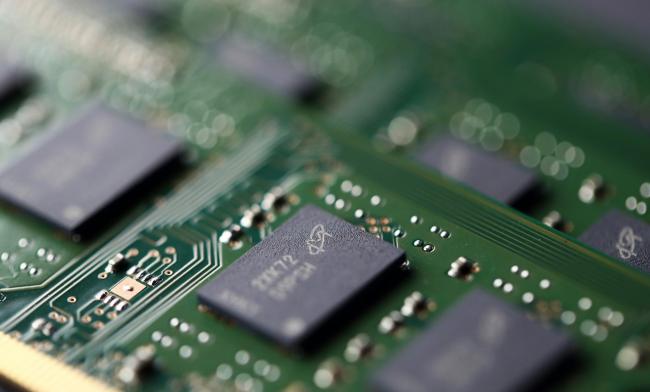(Bloomberg) -- A Chinese state-owned company was charged with conspiring to steal trade secrets of U.S. chipmaker Micron Technology Inc (NASDAQ:MU). as the Justice Department steps up actions against China in cases of suspected economic espionage.
Fujian Jinhua Integrated Circuit Co. and Taiwan’s United Microelectronics Corp. were indicted in California along with three individuals, the Justice Department said Thursday. The U.S. also sued to stop the companies from exporting to America any products that were created using the trade secrets.
Intellectual property theft is among the Trump administration’s chief complaints against China as it wages a trade war that’s rattled global markets and seen the world’s two largest economies slap tariffs on hundreds of billions of dollars of each other’s goods. On Monday, the Commerce Department restricted exports to Jinhua, one of several high-profile government-backed companies at the vanguard of China’s effort to become a major player in global semiconductors.
“Chinese economic espionage against the United States has been increasing, and it has been increasing rapidly,” Attorney General Jeff Sessions said at a press conference in Washington. “It is time for China to join the community of lawful nations. International trade has been good for China, but the cheating must stop.”
A representative for Jinhua declined to comment but said the company will make an announcement “when the time is right.” UMC said it regretted not having the opportunity to discuss the matter with U.S. authorities and will respond to the allegations accordingly, adding it expected no impact from the charges on its finances or business. Its shares fell as much as 2.9 percent Friday.
Accusations that China unfairly acquires technology are at the heart of escalating U.S.-Chinese tensions, along with a plan by the world’s second largest economy to achieve supremacy in a plethora of future technologies.
The latest case was made public as the Justice Department announced a new initiative to respond to Chinese efforts to obtain U.S. technology and trade secrets, whether through hacking or theft by insiders. Sessions said the department’s National Security Division, led by John Demers, along with the FBI and a group of U.S. Attorneys will step up enforcement.
The charges against Jinhua and UMC follow a string of government cases against individuals accused of attempting to steal information on behalf of China. On Tuesday, the U.S. said Chinese intelligence officers worked with hackers and company insiders to acquire commercial aviation technology.
China’s trying to reduce a reliance on some $200 billion of annual semiconductor imports -- about as much as it spends on importing oil. It isn’t home to even one of the top 10 producers of the crucial electronic components. The memory chip market at issue in Thursday’s case has been increasingly concentrated in the hands of Micron and its two Korean rivals, Samsung Electronics (KS:005930) Co. and SK Hynix Inc., who have enjoyed record profits from the technology essential to everything from computers to smartphones. China didn’t possess DRAM capabilities before the alleged theft but had identified its development as a national economic priority, the U.S. said.
Jinhua is a state-owned enterprise funded by the Chinese government and established to design and manufacture dynamic random-access memory chips, or DRAM. The U.S. actions risks choking off supply of the crucial American components it needs and jeopardizing a $5.7 billion wafer-making factory it’s building on the country’s southeastern coast.
Billions Invested
“Micron has invested billions of dollars over decades to develop its intellectual property,” Joel Poppen, Micron’s general counsel, said in an emailed statement. “The actions announced today reinforce that criminal misappropriation will be appropriately addressed.”
Micron, based in Idaho, is the only U.S.-based company that manufactures DRAM. Prosecutors said Chen Zhengkun, also known as Stephen Chen, the president of a Micron subsidiary in Taiwan, resigned in 2015 and began working at UMC. While there, he arranged an agreement between UMC and Jinhua in which UMC would transfer DRAM technology to Jinhua to mass-produce, and the technology would be jointly shared by the companies.
Chen recruited numerous employees of the Micron subsidiary to work with him at UMC, according to the U.S., including He Jianting, also known as J.T. Ho, and Wang Yungming, also known as Kenny Wang. He and Wang both stole several Micron trade secrets related to the design and manufacture of DRAM, the U.S. said.
“The Chinese government’s complicity in intellectual property theft hurts American manufacturers, workers, and consumers, and undermines the ability of U.S. businesses to operate in China,” Senator Mark Warner of Virginia, the vice chairman of the Senate Select Committee on Intelligence, said in an emailed statement.
Micron last year sued UMC and Jinhua, claiming they stole trade secrets. UMC then took legal action against Micron in January, alleging that the company infringed on patents in China related to memory storage and other products. In July, a Chinese court banned Micron chip sales in the country, but the American company said that moratorium affected just 1 percent of its annual revenue.
The criminal case is U.S. v. United Microelectronics Corp., 3:18-cr-00465, U.S. District Court, Northern District of California (San Jose). The civil case is U.S v. United Microelectronics Corp., 5:18-cv-06643, U.S. District Court, Northern District of California (San Jose).
(Updates with UMC’s and Jinhua’s comments from the fifth paragraph.)
